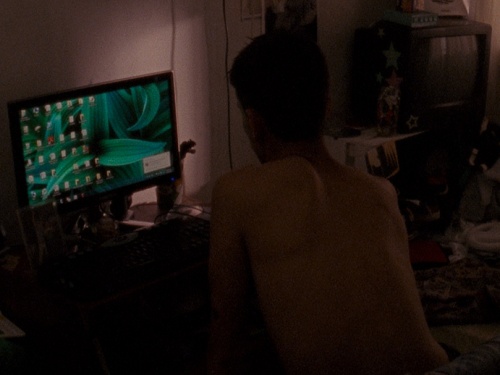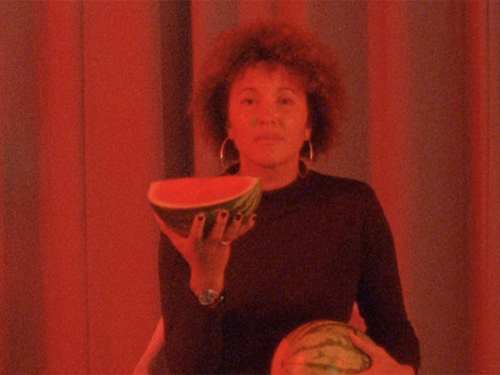Unfettered Expression: Adam Roberts on Chantal Akerman's 'Golden Eighties'
A Nos Amours continues a retrospective of the complete film works of Chantal Akerman at the Institute of Contemporary Arts with Golden Eighties (1986), an exuberant and sparky musical at once an homage to the classic era musicals of MGM and an expression of a highly European modern sensibility: satirical, teasing, resigned. Adam Roberts of A Nos Amours, who has written previously on Akerman's work for the ICA Blog (1 2 3 4), gives us a glimpse into the fantastical world the filmmaker has created for us. You can, of course, see it for yourself at the ICA.
Chantal Akerman and Delphine Seyrig had worked together once before – in the magisterial, astonishing Jeanne Dielman, 23 quai du Commerce, 1080 Bruxelles (1975). They work together again in Golden Eighties, this time to make a musical shot in the bubblegum tones of Fujicolor, bursting with pithy, catchy songs and melodramatic scenes of heartbreak and anguished longing for a better life. Restraint has been replaced by unfettered expression – or so it seems. Seyrig’s character (again called ‘Jeanne’) is married, working in the Toison D’Or shopping mall, a long suffering wife trapped behind a counter. Perhaps she is Jeanne Dielman some years later. Let’s hope her husband has hidden the scissors.
Why would a filmmaker make such a journey from austere art house to exuberant genre film? The answer perhaps lies in the life represented in the Toison D’Or – everything is for sale, everything is desirable if beautifully presented in a shop window, if desire is about how one looks, how one presents oneself. This is after all the 80s – golden or not, depending on your outlook.
The film also makes very clear that the 1980s are a time of economic difficulty – where businesses are failing, where customers are scarce, where only the fittest will survive – and there is no alternative world view on offer. Everything is for sale, if only someone would buy.
And yet, Golden Eighties is no hymn of praise to consumerism and neoconservative ideology. It is a film that offers no ready identifications or point of view. To watch this film is to be busy working out the relationships, the backstories, the internal structures of trust and affection. Yes the film presents a range of (mainly) women fixated on romance and love, yet the dramatic closures on offer lie not in pairing off with the man of a woman’s dreams (disappointments seems all that follows from that!) but in the comfort of women friends, women colleagues, singing and dancing together. Men are either absent, faithless, callow, insincere. Better that men stay in women’s dreams. Women on the other hand…
This is of course an oversimplification. But the pressing question remains: what kind of pleasure is Akerman proposing in Golden Eighties? The surface is very much in contrast to the austere regimes of Jeanne Dielman, where once there were subdued colours, long, durational shots, an absence of close ups, formal framings, use of off-screen sound, and careful structuring of time and sequence, now there is a busy, colourful world, with emotions expressed, hearts worn on sleeves. Golden Eighties is also a delightful confection of ironic play, a delightful teasing of cliché. Akerman is like an expert chef, tossing pancakes at the tableside, presenting a perfectly folded crêpe.
What though of the vampish Lili? She is the object of desire in the mall: the boys sing of her, she breaks hearts, choses who she will seduce. She provokes the on screen chorus to sing like a Greek chorus, commenting on her duplicity, her allure, her command. That is a strategy that develops a complicity between viewer and authorial intelligence. Moreover, this film may also be one of the first releases intended for mainstream distribution where certain protagonists repeatedly catch the camera’s eye: a strategy that unsettles like no other.
Akerman, raising a significant budget for Golden Eighties (her first truly commercial project), moved into the shopping mall but made it her own - a realm of avant-garde activity: authored, mediated, disenchanted, wise – but also fun, wicked and compassionate. She has a sense of the potential pleasures and satisfactions of cinema but the wit to maintain her intellectual grip. ■
This article is posted in: Articles, Film
Tagged with: Adam Roberts, Chantal Akerman, Golden Eighties, Film, Review, Musical





